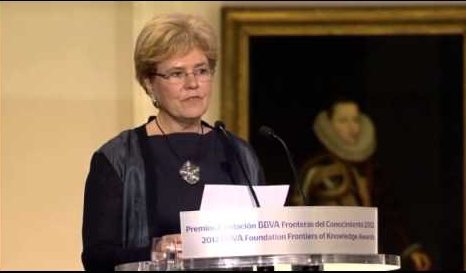The BBVA Foundation Frontiers of Knowledge Award goes to Jane Lubchenco for experimentally characterizing marine ecosystems and providing the science behind the design of protected areas
The BBVA Foundation Frontiers of Knowledge Award in the Ecology and Conservation Biology category has been granted in this fifth edition to U.S. marine ecologist Jane Lubchenco for her experimental work, which has advanced understanding of coastal ecosystems and laid the scientific groundwork for the design of marine reserves. Lubchenco, in the words of the jury’s citation, “has been a leader in establishing marine reserves based on solid principles of ecological science. Her work established a scientific framework for defining the optimal locations, size, and connectivity of marine reserve networks, effectively integrating her scientific expertise into science-based principles for public policy.”
5 February, 2013
Lubchenco, it continues, has the ability to “conceptually expand her basic ecological insights to marine conservation at a global scale, including the design of marine reserves based on solid principles of ecological science.” Through her efforts, marine ecology grew from being an observation-led science to one based on the experimental method. Producing conclusions of immense practical worth, like the fact that “you don’t need to protect the whole sea to protect it effectively.” The key, according to her research, is to develop networks of interconnected protected areas of varying size.
Jane Lubchenco (Denver, 1947) “is a global leader in marine ecology and conservation,” reads the first line of the citation. One of her major findings is that species at the base of the food chain, like plankton and herbivorous sea snails, are among the main drivers of coastal ecosystem dynamics, in a process scientists define as “bottom-up”.
This research, which she conducted in the 1970s, marked a move away from the “top-down” paradigm dominating at the time, which held that it was predators that determined the dynamics of these communities.
“My scientific contribution has focused on understanding how near-shore coastal ecosystems work, how they are changing and how we can do a better job of managing our activities to help the oceans and coast,” said Lubchenco yesterday on the phone. On the subject of her methods, she explains: “My approach has been to test ideas with experiments so we can truly understand how marine ecosystems work. I have worked a lot with sea stars and snails and fishes to understand the role they play in keeping an ecosystem healthy.”
Impact on fisheries
“Lubchenco,” adds the jury, “showed experimentally that the structure and function of coastal ecosystems are controlled by the joint effects of nutrients, light, temperature, and herbivores. Her work demonstrated that coastal upwelling affects both top-down and bottom-up processes.”
These are results whose implications stretch far beyond the bounds of basic knowledge, because they help to elucidate the biological phenomenon known as “upwelling”, whereby nutrients ascend from the sea bed to surface waters, creating areas rich in fish stocks. Indeed many of the world’s most important fisheries are supported by upwelling systems: “Professor Lubchenco’s insights on those ecological processes have been fundamental to understanding that the links between those systems, ocean climate, and ecological perturbation are critical for the long-term sustainability of fisheries.”
It is precisely the stewardship of fishery resources that has been one of her main labors as head of the National Oceanic and Atmospheric Administration (NOAA), a post to which she was appointed in 2009 by President Barack Obama, and from which she will step down voluntarily on February 27. “We have made huge progress in ending overfishing in U.S. waters, and have worked with colleagues in other countries and the European Union to make fishing more sustainable. Because if we want to continue having fish to eat, and for fisherman to have jobs to go to, then we need to fish responsibly today.”
Lubchenco is a firm believer that scientists need to collaborate at global level. Her own field, she points out, has become much more international, “And that has brought many opportunities to compare near-shore marine systems from one place to another. In the process, we have learned a lot about what it takes
to have a healthy ocean, including that biodiversity plays a key role.” This knowledge is vital to understand and confront realities like overfishing, ocean acidification or climate change. Or as she puts it: “We are trying to understand how to make sure oceans stay healthy despite all these changes.”
This was also the motive for her efforts to set up the Partnership for Interdisciplinary Studies of Coastal Oceans (PISCO), a consortium of scientists and academics from Oregon State University; the University of California, Santa Barbara; the University of California, Santa Cruz; and Stanford University, whose mission is to advance understanding of the coastal ocean ecosystem and share that knowledge with society.
Herself an able communicator, Lubchenco is adamant that science and society must engage with each other. “Scientists must learn to talk about their science in ways that are understandable and relevant to real world issues. There is a lot that is exciting about science, and sharing that excitement, the thrill of discovery, the importance of new knowledge and how it is relevant to solving tangible problems is something that scientists need to work at continuously.”
International jury
The jury in this category was chaired by Daniel Pauly, Professor of Fisheries at the University of British Columbia Fisheries Centre (Canada), with Jordi Bascompte, professor in the Integrative Ecology Department of Estación Biológica de Doñana (CSIC) acting as secretary. Remaining members were Joanna Burger, Distinguished Professor of Biology and professor in the Department of Environmental Sciences at Rutgers University (United States); Gerardo Ceballos, professor in the Wildlife Ecology and Conservation Laboratory of the Instituto de Ecología, Universidad Nacional Autónoma de México (Mexico); Pedro Jordano, Research Professor at Estación Biológica de Doñana (CSIC); and Gary K. Meffe, Adjunct Professor in the Department of Wildlife Ecology and Conservation at the University of Florida (United States).


